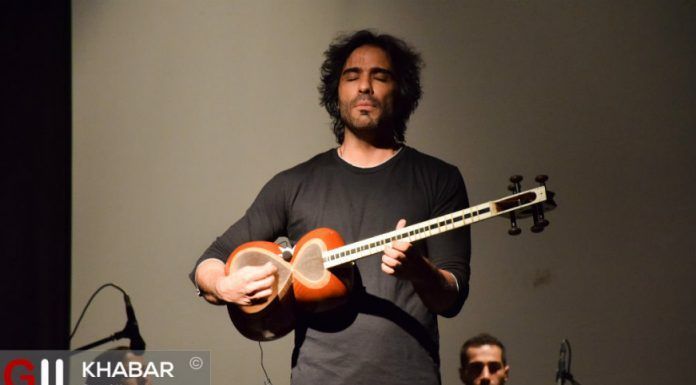9 Jan- The Iranian authorities have banned the tar virtuoso, songwriter and singer Ali Ghamsari from recording and performing in public after he accompanied the solo vocalist Haleh Seyfizadeh in a concert on January 8 at Vahdat Hall (former Roudaki Concert Hall). Mr. Ghamsari, Ms. Seyfizadeh, and keyboard player Behnam Abolghasem had continued to perform even after the stage manager had disabled their microphones. The Islamic Republic does not allow solo female artists to sing on stage.
Writing on his Instagram page, Ghamsari said: “They’ve issued a verbal notice which prohibits me from engaging in any [music] activities in Iran. The Music Office [of the Ministry of Culture and Islamic Guidance] has reportedly received written notification of this decision. They have canceled all of my concerts and performances until further notice.”
Ghamsari added: “Ms. Seyfizadeh, Mr. Abolghasem and I continued to perform the song despite our microphones being turned off. The director of the Roudaki, Mr. [Ali Akbar] Safipour and the security office of the concert hall had warned me that they would turn the sound systems off if we went ahead with our performance as planned. They also pointed out that the authorities would prohibit me from recording or performing ever again.”
Ghamsari explained: “Last night’s concert was stress-free compared to the performances we gave the previous three nights, because I had made my decision to go ahead with the plan. They pressured us during the first three nights, but we kept our mouth shut. In my view, our duet broke no laws. That’s why we were very calm on stage last night. I didn’t perform with the same sad face I had on during the previous three nights.”
“I did not compromise my principles. Perhaps artists like me have no place in Iranian music. Some of my colleagues have accused me of rocking the boat, so to speak. Others think that I made a wrong decision last night. I, however, don’t regret it. I have not fully grasped the implications of my action. I hope there are better days ahead for the Iranian art.”
Writing on her Instagram page, Seyfizadeh said: “Mr. Safipour and Vahdat Hall security had warned me that the authorities would ban Ghamsari from recording and performing if I were to perform with him on stage. I was prepared to pull out of the concert, but Ali insisted that we go ahead and play the song. They had turned off all of the microphones. There was, nevertheless, great energy in the concert hall.”
Seyfizadeh added: “I felt bad because Ghamsari and Abolghasem played their instruments softly so the audience could hear my voice better. Their courage and integrity touched me. We were under plenty of pressure during the first three nights, but we remained quiet. I can’t find words to describe their courage. I am grateful to these kind friends and brave souls who have stood by me during these difficult times. Let’s hope there are better days ahead.”
There has been a marked increase in the number of performing artists, particularly musicians, who have been censored and banned by the authorities. On January 9, Iran’s Attorney-General Mohammad Jaffar Montazeri said: “We will not approve of artists if they operate inside the acceptable creative parameters. They should not cross the red line. We would be prepared to defend their rights if they work within the limits set by God.”
“We caution those artists who break the rules,” Mr. Montazeri explained. “If, however, they ignore our warnings, then we prosecute them to the full extent of the law. We don’t live in a secular country. Therefore, people must adhere to strict religious guidelines.”
Montazeri, however, was quick to point out: “We cannot address artistic and cultural transgressions through arrests, imprisonments, and floggings, and instead must follow the rule of law. We must try to resolve cultural issues without getting the Judiciary involved.”
Translated from Persian by Fardine Hamidi


